
KSCE Journal of Civil Engineering
Scope & Guideline
Fostering Global Collaboration in Engineering Innovation
Introduction
Aims and Scopes
- Structural Engineering:
Research focusing on the behavior and design of structures, including bridges, buildings, and other infrastructures, emphasizing materials, load effects, and stability. - Geotechnical Engineering:
Studies related to soil mechanics, foundation engineering, and the behavior of earth materials under various loading conditions, including tunneling and excavation impacts. - Transportation Engineering:
Investigations into traffic flow, transportation systems, and the design of roadways and transit systems, including the integration of smart technologies for improved mobility. - Environmental Engineering:
Research addressing environmental impacts of civil engineering projects, including water management, pollution control, and sustainable practices. - Materials Engineering:
Analysis and development of construction materials, focusing on durability, mechanical properties, and innovative composite materials. - Hydraulic Engineering:
Studies related to fluid mechanics in civil engineering, including water flow in channels, flood management, and the design of hydraulic structures. - Construction Management:
Research on project management, risk assessment, and optimization techniques in construction processes, including the application of BIM and other technologies. - Innovative Technologies in Civil Engineering:
Exploration of new methodologies, including machine learning, artificial intelligence, and advanced simulation techniques applied to civil engineering challenges.
Trending and Emerging
- Sustainable Construction Practices:
There is a growing focus on sustainability in construction methods, materials, and project management, emphasizing eco-friendly practices and reducing carbon footprints. - Smart Infrastructure and IoT Integration:
The integration of Internet of Things (IoT) technologies into civil engineering projects is trending, with research exploring smart monitoring systems and data analytics for infrastructure management. - Advanced Materials and Nanotechnology:
Research into innovative materials, including nanomaterials and composites, is on the rise, focusing on enhancing the performance and durability of construction materials. - Resilience and Disaster Management:
In light of climate change and natural disasters, there is an increasing emphasis on designing resilient infrastructure capable of withstanding extreme events. - Machine Learning and AI Applications:
The application of machine learning and artificial intelligence in predictive modeling, risk assessment, and optimization in construction and engineering processes is gaining traction. - Geotechnical Innovations:
Innovative approaches in geotechnical engineering, including advanced modeling techniques and new materials for soil stabilization, are emerging as critical areas of research. - Remote Sensing and Geospatial Technologies:
The use of remote sensing and GIS for monitoring, assessment, and planning in civil engineering projects is increasingly popular, reflecting advancements in technology.
Declining or Waning
- Traditional Construction Methods:
Research focused on conventional construction practices has decreased as interest grows in innovative and sustainable methods that leverage technology and materials science. - Simple Analytical Models:
The reliance on basic analytical models for structural analysis has waned, with a shift toward more complex numerical simulations and data-driven approaches. - Static Load Testing:
Interest in static load testing methodologies has diminished in favor of dynamic testing and real-time monitoring techniques that provide more comprehensive data. - Local Case Studies:
The prevalence of localized case studies has decreased, as there is a growing emphasis on global perspectives and comparative analyses across different regions. - Non-structural Aspects of Civil Engineering:
Research focusing on non-structural aspects, such as aesthetic considerations or minor design features, has seen a decline as the emphasis shifts toward performance and sustainability.
Similar Journals
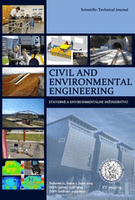
Civil and Environmental Engineering
Innovating solutions for a resilient environment.Civil and Environmental Engineering, published by SCIENDO, is a prominent open-access journal dedicated to advancing research and knowledge in the fields of civil and structural engineering, as well as environmental engineering. Since its inception in Germany, it has been committed to promoting cutting-edge studies and methodologies that address the pressing challenges in these domains. With an ISSN of 1336-5835 and E-ISSN of 2199-6512, the journal is accessible to a global audience, having adopted an open-access policy since 2014 to enhance the visibility and dissemination of scholarly work. The journal currently holds a Q3 ranking in both Civil and Structural Engineering and Environmental Engineering, as of 2023, reflecting its growing influence within the academic community. It operates within a framework of rigorous peer-review standards and encourages contributions that not only contribute to theoretical advancements but also have practical implications for real-world applications. Researchers, professionals, and students alike will find invaluable insights and innovative perspectives in the latest studies published from 2018 to 2024.

Periodica Polytechnica-Civil Engineering
Pioneering Solutions for Modern Infrastructure NeedsPeriodica Polytechnica-Civil Engineering is a prestigious journal published by the Budapest University of Technology and Economics, dedicated to advancing the field of civil engineering through high-quality research and innovative practices. Established in 1972, the journal has transitioned through various phases of publication and now spans an expansive range of topics within civil and structural engineering, geotechnical engineering, and engineering geology. With an impact factor indicating its growing influence and a commendable placement in the Q3 quartile according to the latest 2023 metrics, it recognizes contributions that bridge theoretical advancements with practical applications. While currently not open access, the journal remains a vital resource for researchers, professionals, and students seeking to stay abreast of the latest developments in engineering design, construction techniques, and geotechnical innovations. The continuous publication of significant research after almost five decades underscores its commitment to disseminating knowledge crucial for the world’s infrastructure challenges, making it an essential reference point within the engineering community.

Infrastructures
Innovating Infrastructure Solutions for a Sustainable FutureInfrastructures is a distinguished open-access journal, published by MDPI since 2016, dedicated to advancing the fields of engineering and construction through interdisciplinary research and critical insights. Based in Switzerland, it serves a global community of scholars and professionals, providing a platform for innovative studies that drive progress in Building and Construction, Civil and Structural Engineering, Computer Science Applications, Geotechnical Engineering and Engineering Geology, and various aspects of Materials Science. With an impressive impact factor and a positioning in the Q2 category across multiple engineering fields, the journal's robust ranking reflects its commitment to high-quality research, with notable Scopus rankings showcasing its significant contribution to academic discourse. Infrastructures not only facilitates open access to essential knowledge but also aims to bridge the gap between theory and practical application, making it an invaluable resource for researchers, industry professionals, and students alike.

Revista de la Construccion
Building Bridges Between Research and Real-World ApplicationRevista de la Construcción is a pivotal academic journal dedicated to the field of civil engineering and construction, published by the prestigious Pontificia Universidad Católica de Chile, Escuela de Construcción Civil. With its ISSN 0718-915X, this journal serves as a crucial platform for disseminating innovative research, case studies, and advancements in construction methodologies that address contemporary challenges within the industry. While currently not classified as open access, it provides valuable insights benefiting researchers, professionals, and students engaged in construction development and sustainability. The journal enhances the academic discourse and contributes significantly to knowledge in engineering practices, project management, and material science. Based in Santiago, Chile, the journal aims to foster collaboration and knowledge exchange among experts both locally and globally, making it an essential resource for those striving to advance the science and practice of construction.
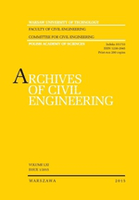
Archives of Civil Engineering
Empowering Engineers Through Quality ResearchArchives of Civil Engineering is a premier academic journal published by POLISH ACAD SCIENCES, dedicated to advancing the field of civil and structural engineering. Established in 1996, this open-access journal has been pivotal in disseminating high-quality research and innovation in engineering practices, particularly since adopting open access in 2010. With an ISSN of 1230-2945 and E-ISSN of 2300-3103, it enjoys a notable reputation, currently ranked in Q3 of the Civil and Structural Engineering category for 2023, reflecting its considerable contribution to scholarly content in the discipline. The journal caters to a diverse audience of researchers, professionals, and students, providing them with a platform to share and access essential findings. Its commitment to high academic standards is underscored by its ranking in Scopus, where it stands at Rank #265/379. Located in Warsaw, Poland, the journal aims to promote international collaboration and foster knowledge exchange in civil engineering, making it an indispensable resource for anyone involved in this dynamic field.

Civil Engineering Journal-Tehran
Elevating Global Standards in Civil and Structural Engineering.Civil Engineering Journal-Tehran is a premier academic publication focusing on the dynamic fields of civil engineering, construction, and environmental science. Published by C EJ PUBLISHING GROUP, this journal has garnered significant recognition, reflected in its impressive quartile rankings—ranking Q1 in Building and Construction and Civil and Structural Engineering, and Q2 in Environmental and Geotechnical Engineering. With its ISSN 2676-6957 and E-ISSN 2476-3055, this journal serves as a crucial platform for disseminating innovative research and advancements from 2019 through 2024. Notably situated at K N Toosi University of Technology in Tehran, Iran, it emphasizes both local and global perspectives on civil engineering challenges. Aiming to foster scholarly discourse, the journal is essential for researchers, students, and professionals dedicated to the evolution and sustainability of civil engineering practices.

World Journal of Engineering
Bridging Theory and Practice in Engineering AdvancesWorld Journal of Engineering, published by EMERALD GROUP PUBLISHING LTD, stands as a premier platform for disseminating high-quality research across various engineering disciplines. Since its inception in 2014, the journal has built a reputation for its rigorous peer-review process and commitment to advancing knowledge in the fields of Civil and Structural Engineering, Electrical and Electronic Engineering, Geotechnical Engineering, Mechanical Engineering, and Mechanics of Materials. With its categorization in the Q3 quartile across multiple engineering domains and notable Scopus rankings, the journal positions itself as a valuable resource for researchers, professionals, and students seeking to stay abreast of innovations and critical developments in engineering. While the journal currently operates under a subscription model, its comprehensive scope ensures that it remains a vital reference point for contemporary engineering challenges and solutions throughout the United Kingdom and beyond.
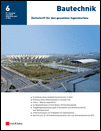
Bautechnik
Elevating standards in building and civil engineering scholarship.Bautechnik is a premier academic journal in the fields of Building and Construction and Civil and Structural Engineering, published by ERNST & SOHN in Germany. With a history dating back to 1969 and a significant converged timeline through various years, this journal offers a rich repository of peer-reviewed research dedicated to advancing the principles, methodologies, and innovations within its domains. Bautechnik is currently ranked in the Q3 category for both building and construction, as well as civil and structural engineering, indicating its relevance and contribution to the academic community. Though it does not offer open access, its curated content is accessible to a global audience of researchers, professionals, and students striving for excellence in their fields. The journal aims to foster discussions and disseminate knowledge that impacts the future of construction, architecture, and engineering practices.
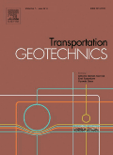
Transportation Geotechnics
Empowering Researchers to Shape Tomorrow's Transport Networks.Transportation Geotechnics is a premier academic journal published by Elsevier, focusing on the intersection of geotechnical engineering and transportation systems. With an impressive impact factor and categorized in the Q1 quartile across multiple disciplines including Civil and Structural Engineering, Geotechnical Engineering, and Transportation, this journal stands as a vital resource for researchers and practitioners alike. It covers a broad spectrum of topics ranging from soil behavior in transport contexts to innovative materials and methods that enhance infrastructure stability and performance. As an essential platform fostering knowledge dissemination, Transportation Geotechnics enables contributors to share their groundbreaking findings while providing readers with access to cutting-edge research and reviews from 2014 to 2024. Its illustrious Scopus rankings place it prominently in the global research landscape, making it an indispensable tool for students, professionals, and academics dedicated to advancing the field.
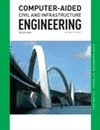
COMPUTER-AIDED CIVIL AND INFRASTRUCTURE ENGINEERING
Advancing the Future of Infrastructure EngineeringCOMPUTER-AIDED CIVIL AND INFRASTRUCTURE ENGINEERING, published by WILEY, stands as a leading journal in the domains of civil and structural engineering, computational theory, and computer-aided design since its inception in 1986. With an impressive ISSN of 1093-9687 and E-ISSN of 1467-8667, this esteemed UK-based journal holds a prestigious position in the academic community, reflected by its Q1 ranking in numerous relevant categories, including Civil and Structural Engineering and Computer Graphics as of 2023. The journal is renowned for promoting innovative research that utilizes computational techniques to solve complex engineering problems, making it an essential resource for researchers, professionals, and students alike. Despite its lack of open access options, the journal garners significant interest due to its rigorous peer-review process and high-impact articles, underlining its importance in the advancement of infrastructure engineering practices and technologies. With a Scopus ranking placing it among the top journals in various engineering and computer science fields, COMPUTER-AIDED CIVIL AND INFRASTRUCTURE ENGINEERING continues to foster knowledge and collaboration, ultimately contributing to the future of smart and resilient infrastructure development.